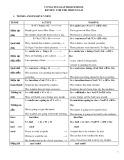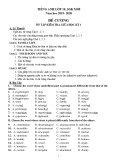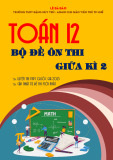
REVISION FOR THE FIRST TERM TEST – GRADE 10
I. MCQs
Choose the word whose underlined part is pronounced differently from that of the others.
1. A. thousand B. about C. around D. should
2. A. put B. produce C. calculate D. computer
Choose the word whose main stress pattern is not the same as that of the others.
3. A. repair B. harrow C. arrive D. announce
4. A. target B. guitar C. traffic D. language
Choose the best answer.
5. _________ does he want to study English? - Because it is an international language.
A. Who B. How C. What D. Why
6. A good ___________of information Technology will help you use the computer easily .
A. skill B. knowledge C. research D. expensive
7. After each period, we have a ___________break.
A. five minutes B. five- minute C. fifth- minute D. fifth- minutes
8. The synonym of “education” is ___________.
A. schooling B. scholarship C. learning D. studying
9. Ha: "May I have my dictionary back?" Le: " I remember _________you last week".
A. bringing B. brought C. to be brought D. to bring
10. Tom ___________. Please don’t disturb him.
A. studies B. is studying C. was studying D. has studied
11. When Tom arrived at the cinema, the film ___________.
A. starts B. started C. has started D. had started
12. My brother ___________swimming since he was young.
A. enjoyed B. has enjoyed C. would enjoy D. was enjoying
13. The taxi can’t __________ us at our office because there is a ban on vehicles in this street.
A. lead B. set C. pump D. drop
14. The man ___________to your sister is my uncle.
A. is talking B. was talking C. who is talking D. talked
15. They have been friends _____________years.
A. during B. for C. from D. since
16. What ___________at this time yesterday?
A. did you do B. you did C. were you doing D. had you done
17. He ___________to his parents recently.
A. writes B. wrote C. has written D. was writing
18. ___________his mental illness, the boy can’t keep pace with his classmates.
A. Although B. Despite C. Because D. Because of.
19. A well- ___________child often behaves quite differently from one who did not get good schooling.
A. educate B. education C. educating D. educated
20. Although he coughed badly, he ___________no effort to stop smoking.
A. make B. do C. made D. has
21. John isn’t contented with his present salary.
A. satisfied with B. excited about C. interested in D. disappointed about
22. Harry works all the time. He ________.
1

REVISION FOR THE FIRST TERM TEST – GRADE 10
A. often relaxes B. relaxes sometimes C. relaxes never D. never relaxes
23. Just keep on ________ what you like.
A. done B. do C. doing D. did
24. I want ________ . I hope ________ for the team.
A. to play/ choosing B. to play/ to choose
C. playing/ being chosen D. to play/ to be chosen
25. What time is the flight ________ to arrive?
A. thought B. plan C. due D. bound
26. I was late for school this morning because my alarm clock didn’t ________.
A. go off B. go up C. go away D. go on
27. We are in regular ________ with each other by telephone or letter
A. communicate B. communication C. communicative D. communicative
28. The President expressed his deep sorrow over the bombing deaths.
A. regret B. anger C. happiness D. passion
29. He said that he ________ his work since 7 o’clock.
A. did B. has done C. had done D. would do
30. She remembered the correct address only __________ she had posted the letter.
A. since B. before C. then D. after
31. They will never forget __________ the places where they have visited.
A. see B. to see C. seeing D. will see
32. His manager regrets __________ him that his application for the job has been turned down.
A. tell B. to tell C. telling D. tells
33. Nam has not _______phoned me since he moved to London last year.
A. be B. being C. been D. X
34. Many trees in this forest have been _______ down for wood and farming.
A. cut B. to cut C. cutting D. to cutting
Identify the mistake in each sentence by circling letter A, B, C or D
35. We used to going fishing on this river when we were small children.
A B C D
II. REWRITE THE SENTENCES AS FOLLOW
1. He is worried about the next examination.(Make questions)
……………………………………………………………………………
2.I like English very much. (Make questions)
……………………………………………………………………………
3.We need to provide more shelters for people who are without place to live. (Rewrite using the
and an adjective instead of the underlined phrases.)
……………………………………………………………………………
4.People with severe disabilities need full-time care.(Rewrite using the and an adjective instead of
the underlined phrases.)
……………………………………………………………………………
5.I went to the church when I was a child. (Rewrite using used or didn't use to.)
……………………………………………………………………………
6.Since we've lived in the countryside. We've been much happier. (Rewrite using used or didn't use
to.)
2

REVISION FOR THE FIRST TERM TEST – GRADE 10
……………………………………………………………………………
7.Mr Micky grew tulips but he doesn't any more. (Rewrite using used or didn't use to.)
……………………………………………………………………………
8.His teacher has transferred him to another class. (Turn into the passive.)
……………………………………………………………………………
9.Have you fed the dogs yet? (Turn into the passive.)
……………………………………………………………………………
10.We plan to study oversea in America. (Rewrite, keep the same meaning )
We’re going ……………………………………………………………
11. I worked very hard for the exam. Then I passed it. (Rewrite, keep the same meaning )
Before.....................................................................................................
12. First I considered what to study. Then I decided to major in Maths.. (Rewrite, keep the same
meaning )
After ..............................................................................................
13. She wrote a letter. Then she went to bed. (Rewrite, keep the same meaning )
Before...............................................................................................
14. The girl chatted with him yesterday. She arrived here at 6.30. (Rewrite , using a relative clause)
……………………………………………………………………………
15. I’m reading the book. I bought it in Sydney in 1986. (Rewrite , using a relative clause)
……………………………………………………………………………
16. The man is not talking to my father. This makes him very upset. (Rewrite , using which as a
connector)
……………………………………………………………………………
17.Although it was cold, we went swimming. (Rewrite, using a phrase)
In spite of ……………………………………………………………………………………………
18. He got bad marks because of his carelessness in writing. (Rewrite, using a clause)
Because …………..……………………………………………………………………………….
19. He is still interested in playing sports in spite of his old age. (Rewrite, using a clause)
Although ………………………………………………………………………………
20.“ I don’t want that student in my class.” (Rewrite with reported speech)
The teacher said ………………………………………………………………………
21. “ We haven’t been to the art gallery for ages.” (Rewrite with reported speech)
They said ………………………………………………………………………………
22.“ The weather may get much worse tomorrow.” (Rewrite with reported speech)
He told me ……………………………………………………………………………
23. Go now or you will be late for school. (Rewrite with an if clause)
If……………………………………………………………………………………..
24. Water these plants or it will die. (Rewrite with an if clause)
If…………………………………………………………………………………….
25. Don’t take this job if you don’t really want it.
Unless………………………………..………………………………..…………….
III. II. READING
3

REVISION FOR THE FIRST TERM TEST – GRADE 10
A. Lexical reading:
Read the following passage and choose A, B, C, or D to fill in the gaps:
PASSAGE 1:
James Cook was born in England in 1728. His parents were poor farm workers______ (1) James
was 18, he found a job on a coastal ship. He worked ______ (2) ships until he was 27 years old, and
then he joined the navy. He fought in Canada in a war against France. In 1768 King George III
______ (3) him the captain of a ship and ______ (4) him to the Pacific. He was gone for ______(5)
three years when he returned, he was a national hero. For a long time, Europeans believed that there
was a great southern continent south of the equator. They thought it covered most of what is really
the South Pacific.
1. A. while B. when C. because D. during
2. A. in B. on C. for D. under
3. A. has made B. makes C. made D. had made
4. A. got B sent C. had D. gave
5. A. nearly B. near C. nearby D. nearer
PASSAGE 2:
Read the following passage and choose A, B, C, or D to fill in the gaps:
No writer in American literature is more famous or more loved than Samuel Longhorn Clements
born in Missouri in 1835, he grew ______ (1) on the bank of the Mississippi river and later adopted
the pen name Mark Twain.
The river environment inspired the two novels ______ (2) made him famous.: "Tom Sawyer
and Huckleberry Finn" ":Life on the Mississippi", told of his adventures on the river ______(3) of
that period.
Mark Twain's life as a writer started during the Civil War. At that time he ______(4) as a
newspaper man in Nevada and California. His short story "The celebrated Jumping Frog of
Calaveras County" was an immediate ______(5) and his new career began.
1. A. up B. of C. to D. with
2. A. where B. who C. whose D. which
3. A. ships B. trains C. boats D. planes
4. A. works B. worked C. is working D .was working
5. A. success B. successful C. succeed D. succeeding
PASSAGE 3:
Read the following passage and choose A, B, C, or D to fill in the gaps:
Television is an important (1)______of the 20th century. It has been so popular that now we
can't imagine what life would be if there (2)______ no television. Television is a major
mean______(3) communication. It brings (4)______ and sounds from around the world into
millions of home. T.V viewers can see and learn about people, places and things in faraway lands.
T.V widens our knowledge by introducing us to new ideas(5) ______ may lead us to new hobbies
and recreations. In addition to the news, T.V provides us with a variety of programs that can satisfy
every taste. Most people now seem to like spending their evenings watching T.V. It is more
convenient for them to sit at home watching T.V than to go out for amusement elsewhere.
1. A. invent B. inventive C. invention D. inventor
2. A. was B. were C. is D. are
4

REVISION FOR THE FIRST TERM TEST – GRADE 10
3. A. of B. in C. to D. with
4. A. pictures B. sorrow C. money D. viewers
5. A. who B. whom C. when D. which
PASSAGE 4
Nowadays lots of people drive to large supermarket to (1)___ their shopping. These
supermarkets have car-parks, so you can buy several (2)___ of shopping. You can fill your trolley,
and (3)___ put it to your car. Some people prefer to go to local shops. These small shops are usually
(4)___ than supermarkets. Some towns have an open air market in the center, (5)___ you can buy
fruit and vegetables, but you have to carry your shopping home.
1. A. make B. take C. have D. do
2. A. shops B. bags C. pockets D.
customers
3. A. then B. first C. second D. after
4. A. cheaper B. cheap C. expensive D.
most expensive
5. A. which B. who C. where D.
whom
PASSAGE 5
Kevin teaches (1) ____ at a high school. He enjoys his teaching very much, and he always
feels very self-confident and proud when he is standing on the teaching platform. Some of his ex-
classmates have just offered him a chance (2) _____ them in a new company to produce computer
software for businesses. Everyone thinks that it (3) ____ very well. Kevin will probably earn more
money than he does at the high school. The new company is (4) ____, and the money may be good
in deed. (5) ____, Kevin can hardly quit his teaching job! He loves it.
1. A. mathematics B. mathematic C. mathematical D. mathematician
2. A. joining B. join C. joins D. to join
3. A. was done B. does C. did D. will do
4. A. excited B. exciting C. excitedly D. excitement
5. A. However B. Therefore C. Furthermore D. Consequently
B. Comprehension
Choose the item among A, B, C or D that best answers the question about the passage.
PASSAGE 1.
A newspaper makes money from the price people pay for it and also from the advertisements
it carries. A popular newspaper with a circulation of over five million a day makes a lot of money.
Serious newspapers are read principally for their news, sent to them by their correspondents around
the world and by the big news agencies. People also read these newspapers for their reviews of new
books, movies, plays, and for their editorials, which present the opinion of the newspaper itself about
the important events and issues of the moment. Less serious newspapers are probably read just for
entertainment. They have big headlines above the news stories, funny cartoons to look at and
sensational photos of violence.
5


























